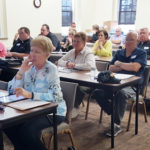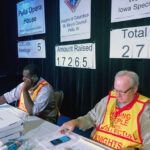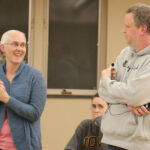
Around the time jurors convicted a white, former police officer of the murder of a Black man in Minneapolis, an Iowa City coalition was advocating for justice for excluded workers, some of whom are undocumented persons of color. Stories about each of these events appear in this week’s Catholic Messenger and underscore the need for those of us who are white and in power to get to know people of color.
Our common ground begins with our humanity. “Beloved, we are God’s children now; what we shall be has not yet been revealed. We do know that when it is revealed we shall be like him, for we shall see him as he is” (1 John 3:1-2).
We need to replace our fear about what makes us different from another person and discover how those differences can enrich our relationships. We need to risk feeling uncomfortable when we uncover our own biases and misconceptions about a person whose skin color differs from ours. Building relationships always requires dying to self. Couples in thriving marriages understand that clearly. “Be willing to have the uncomfortable conversations and turn them into teachable moments,” says Thomas Mason IV, a Black Catholic and parishioner at Sacred Heart Cathedral in Davenport.
Living in a community where everyone shares the same skin color does not provide an excuse to avoid getting to know a person of a different color. Turn to resources such as the St. Martin de Porres Society, led by Mason at the cathedral, which promotes racial unity and Black awareness among Catholics in our diocese. Contact Mason (thomasmason1928@gmail.com) for more information. The Iowa City Catholic Worker is another resource, providing hospitality to and accompanying refugees and immigrants of color, as well as other people on the margins of society. Prayerfully consider volunteering at the Iowa City Catholic Worker house (contact iowacitycatholicworker@gmail.com).
Think about the people of color that you have met, if only in passing. People like Rosa Brito Pastor, who worked in a Mexican restaurant before being laid off during the pandemic. Or Ingris Diaz, who works in hotel cleaning. Or the construction workers, gardeners, daycare providers, farm workers, doctors and lawyers, engineers and professors. Listen to their stories, and do so without passing judgment on their legal status.
Take the advice of Chase Mason, the 18-year-old son of Thomas Mason, who asks us to “try to look at our society through a minority’s perspective and understand the problems they face.” Invite Thomas, Chase, Jim Collins, Tyla Sherwin-Cole and other Black Catholics in our diocese to an in-person or virtual get-together with your small faith-based or civic group. Email
arland-fye@davenportdiocese.org for contact information.
Supplement personal encounters with information about racism gleaned from the Diocese of Davenport website (www.davenportdiocese.org and click on the “Response to Racism” icon). The website offers prayer resources as well, an essential element to building relationships. The websites of the U.S. Conference of Catholic Bishops (usccb.org) and the Iowa Catholic Conference (iowacatholicconference.org) also offer resource materials on racial justice and on immigration issues.
Speak out against biased language, racial jokes, and dehumanizing language. “Think before you speak,” Tyla Sherwin-Cole advises. Suggest an intention for racial justice and equity to be included in Prayers of the Faithful in your parish’s celebration of the Sunday liturgy. Parishes might consider boosting diversity through informal relationships with a faith community that has a more diverse congregation. Start with a virtual prayer group.
In a recent column, syndicated columnist Michael Gerson made the following observation that all people of faith ought to reflect on. “White people in America tend to assume, at a deep level, that America’s economic, governmental and legal systems are roughly fair. … Because American systems seem fair, it must be individuals’ fault when they are poor, powerless or imprisoned. It is a failure of imagination that leads to the persistence of injustice” (Quad-City Times, 4-25-21).
Father Bryan Massingale, in his book, “Racial Justice and the Catholic Church,” reminds us that our “Baptism rightly understood and practiced cannot but affect our social valuing, our political decisions, and the way we understand our fundamental identities and our relationship to one another and the society in which we live (p. 124).”
Barb Arland-Fye, Editor
Arland-fye@davenportdiocese.org











